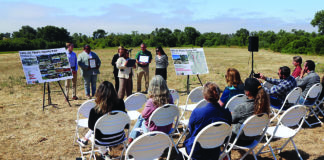At the moment, it seems that there is a very small number of Watsonville residents that have a grasp of the enormous question they will face in the November election.
That is extremely troubling.
Come Nov. 8, Watsonville voters will decide whether they would like to extend current restrictions on outward growth for another 18 years. These restrictions, approved by voters 20 years ago, were put in place to preserve pristine agricultural land surrounding the city, and encourage developers to focus their projects on vacant lots inside city limits.
That description in itself is a very limited summary of Measure U, but it should serve as a starting point of a wide-ranging community discussion about Watsonville’s current state and its future.
Many fellow Watsonville residents often complain to me about a lack of shopping, entertainment and dining options. Others protest—correctly—that housing is too expensive, and that there are no new homes being built for purchase in Watsonville. And, of course, there is never a shortage of people who complain about traffic and the awful state of Watsonville’s infrastructure.
These are all valid gripes, but the issue is that these folks have been largely left out of the ongoing discussions about Measure U. Case in point: the lone people who spoke at Tuesday night’s Watsonville City Council meeting, which we covered in this week’s front-page story, were members of the Committee for Planned Growth and Farmland Protection.
That group of environmentalists, agriculture reps and activists brought the extension of Measure U forward by gathering signatures from 10% of Watsonville’s voting body. They have said that gathering those 2,400 signatures proves that Watsonville residents are overwhelmingly satisfied with the state of the city and that they do not want to overtake an inch of agricultural land to build new housing or businesses.
We don’t know if that’s true, and the conversations happening now are doing nothing to find out if this is indeed the case.
Instead, the committee on Monday sent a letter from their lawyer to the city council threatening litigation for an “illegal” report about Measure U’s impact on the city. They say the report is one-sided and that it does little to highlight the positive effects of Measure U.
Funny enough, the committee put together its own impact report that it sent to the city council. Unsurprisingly, that report does not mention any of the negative impacts that are related to the measure and glosses over real challenges Watsonville faces in developing land within city limits—we only need to look at the stalled housing developments off Ohlone Parkway to see this in practice.
Want to know why people hate politics? Look no further.
At the end of Tuesday night’s Watsonville City Council meeting, several councilmembers said they are looking forward to resuming discussions with people on the committee to find some compromise now that the issue is on the ballot.
Those talks should’ve happened prior to the committee’s signature-gathering efforts. Now that the decision is in the voters’ hands, those talks are meaningless, and only further belittle the people who will truly bear the brunt—or reap the rewards—of the election’s outcome: Watsonville’s everyday citizens.
Members of the committee say that this generation, the Millennials and Generation Zs, should not be the ones to make this decision. The decision, they say, should be made 18 years from now by our children. This is an awful approach to governance and community building, and it’s extremely shortsighted.
Nobody operates in a vacuum. The decisions made today impact the future our community will have tomorrow.
I’m still undecided about what the right decision is. They both have negatives and positives. Allowing Measure U to expire won’t mean that developers will start building houses and hotels the next day. There are checks and balances to that process that take several months, years even. And simply opening up land for development doesn’t mean the new businesses and jobs will come flocking—the Manabe-Ow Business Park being a quarter of the way filled serves as a prime example.
But thrusting this decision—to continue down the road we’ve been on for another 18 years—onto Watsonville voters without so much as a handful of town halls, is disappointing for both the City and committee.
There is an enormous amount of work to be done to educate people about the decision in front of them. That is, of course, if either side truly wants the community to have full autonomy over its future.
That is the real question before us.
Tony Nuñez is the Managing Editor of the Pajaronian. Reach Nuñez at tn****@********an.com.











